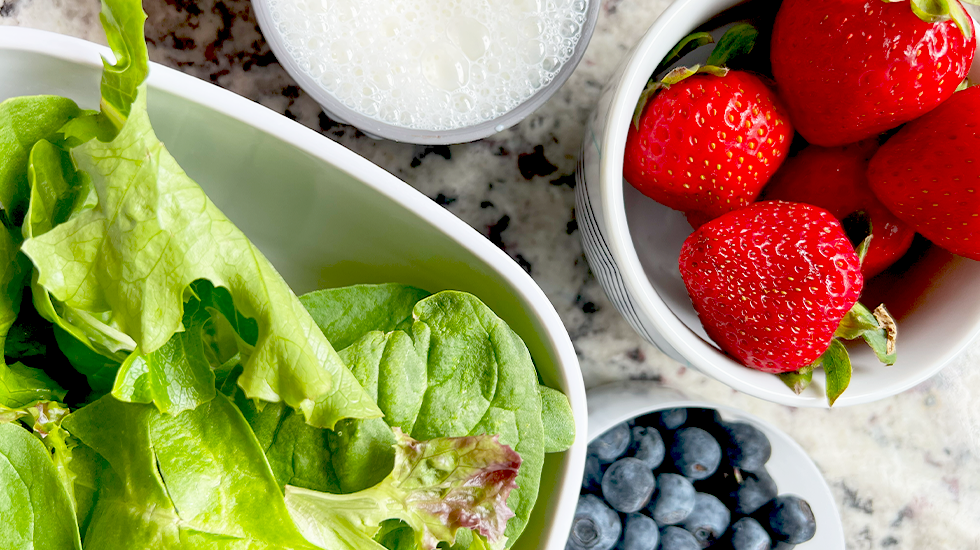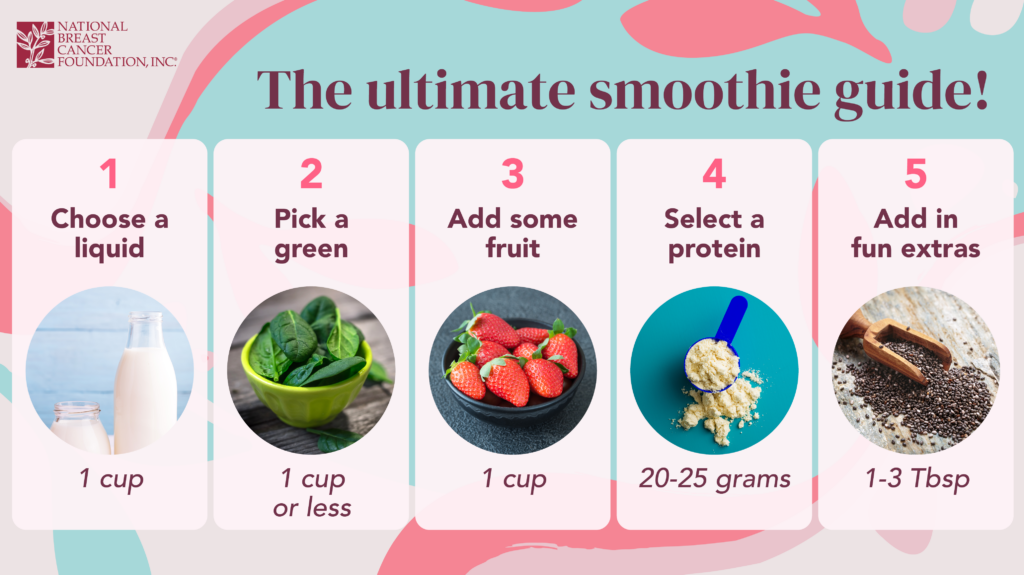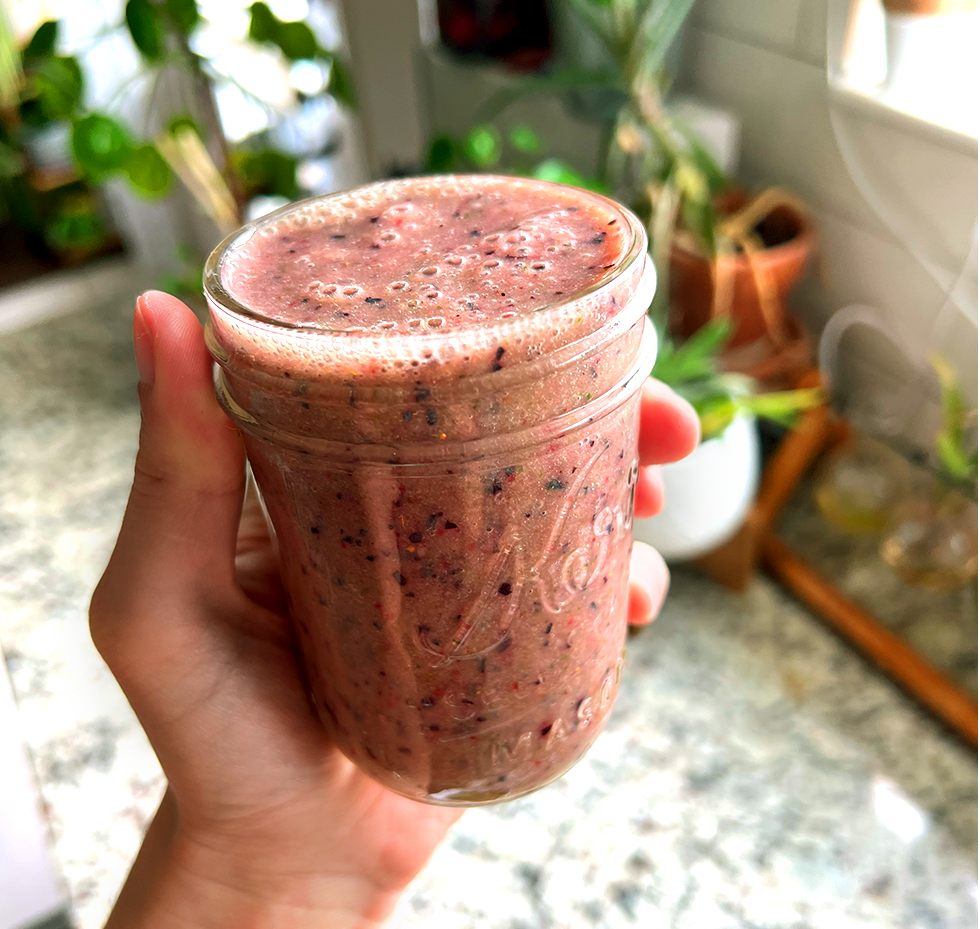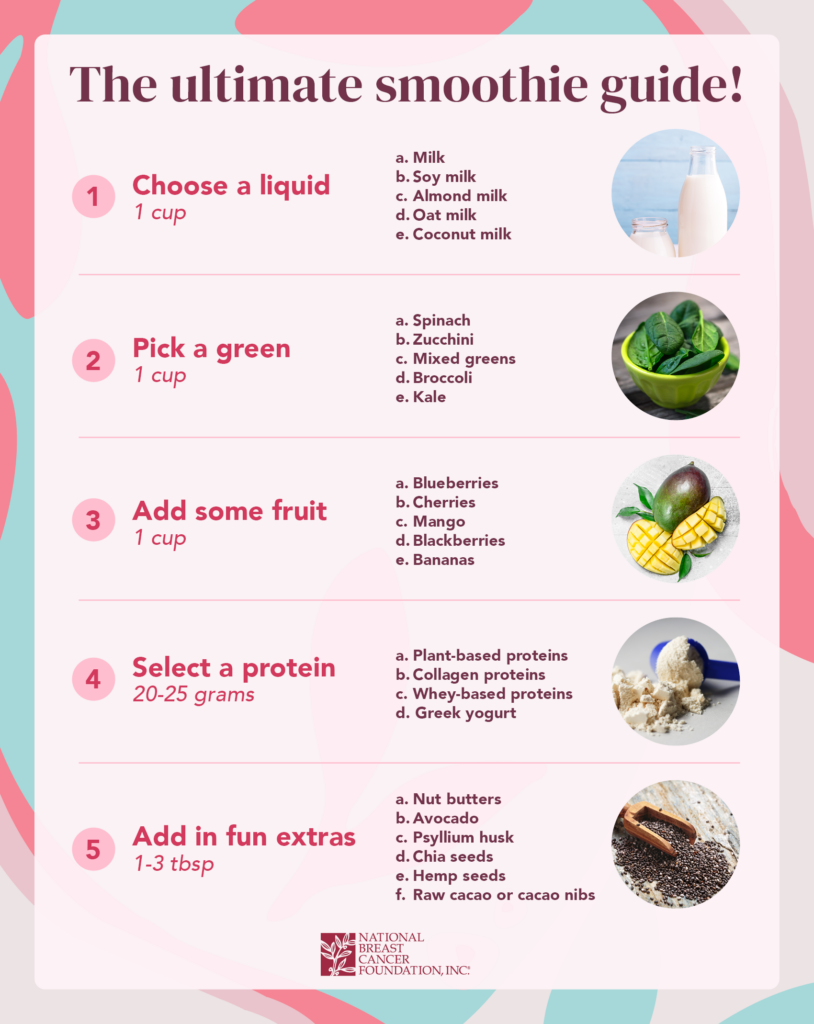


Written by Annie Cavalier, MS, RDN, LD
Smoothies are one of my absolute favorite breakfast go-to’s because they are super quick to make and can be packed with nutrients and great flavors! Many people have a hard time meeting the recommended five servings of fruits and vegetables per day, so why not start your day with some of these nutritious foods in your breakfast?
Use this article as a guide to make your own smoothies, but feel free to customize it! If you want more or less of a certain ingredient, don’t be afraid to try it. The great thing about smoothies is that there is an endless number of variations, and you can really tailor them toward your own preferences.
As a quick note: Before you get started, you can use either fresh or frozen fruits and vegetables, but don’t forget to wash any fresh fruits or vegetables well by rubbing them under cold running water before adding them to the blender! This will help get rid of the bacteria that may be on these foods and promote overall food safety, which is extremely important, especially when your immune system is low during cancer treatment. You can also use a vegetable scrubber to help clean anything with thick skin, but the FDA and CDC do not recommend using soaps, bleach, or commercial produce washes as these can leave residues behind that have not been tested for their safety.1–3,4(p3),5
Learn more about food safety and preparation for patients undergoing cancer treatment.

I recommend using about 1 cup of liquid for your smoothie base.
There are so many different options out there now for “milk” including regular cow’s milk, almond milk, oat milk, coconut milk, and more. Any of these options are completely fine to use as your base, but you should know that they are not all created equally when it comes to nutrition.
In terms of plant-based milks, soy milk is the closest nutritionally to cow’s milk (which is generally much higher in nutrients than most plant-based milks) and contains roughly the same amount of protein, while other non-dairy milks are typically much lower in this nutrient.6 You may have heard that there is quite a lot of controversy surrounding soy and breast cancer. Soy contains compounds called isoflavones, which has a similar structure to the estrogen found in your body. While there are some older studies using laboratory animals that indicated soy might increase the risk for breast cancer, more recent studies done with humans contradict this. Experts believe that these conflicting results are due to the fact that animals and humans may process soy differently.7 In fact, there are many studies done in humans that show that consuming these isoflavones may actually reduce the risk of breast cancer or recurrence.8–12 The consensus among experts is that moderate consumption of soy-based foods is safe, but to avoid soy or isoflavone supplements which are much more concentrated.7,13,14 With that being said, there are some doctors who still recommend limiting soy foods just to be on the safe side. Feel free to talk to your doctor or registered dietitian for more information!
If you want to stick with plant-based milk but are not comfortable with the isoflavones in soy milk, there are plenty of other great options. As mentioned above, these milks do tend to be lower in other nutrients, especially protein, so you just need to make sure to get these nutrients from other sources (keep reading for more information on protein options for smoothies).
If you opt for non-dairy milk, try getting one that says it is fortified with calcium and vitamin D. That means that it has had these two nutrients added to it to enhance its nutritional quality and make it a little more similar to cow’s milk.
While I always add approximately 1 cup of green vegetables to my smoothies, feel free to use less if you are new to the idea of vegetables in smoothies and gradually increase the amount as you prefer.
If you are not used to having vegetables in your smoothie, it may sound a bit odd, but there are plenty of reasons why you should try it! Vegetables are a great source of fiber, which does so many great things for your body, including lowering the risk of developing certain types of cancer, promoting gut health, helping to maintain good blood sugar control, reducing blood cholesterol levels, and so much more! Green vegetables are also packed with antioxidants which help protect the cells in your body from damage due to the environment.
Here are some of my favorite greens to add to smoothies:

I recommend using a total of 1 cup of fruit for your smoothies. If you are using more than one fruit, divide them up so that the total volume is approximately 1 cup.
I love to use frozen fruit for smoothies because it is ready to go (no washing, peeling, or slicing required) and is usually cheaper too! Using frozen fruit also means that you don’t have to add any ice to your smoothies, so that’s one less step before your breakfast is ready! If you do opt for fresh fruit instead of frozen, make sure to remove any pits from stone fruits such as cherries, apricots, peaches, and dates, and as always – make sure to wash them well!
Just about any fruit is delicious in smoothies, but here are some of my favorites:
The list could go on and on about different types of fruit that are great in smoothies and have a wide range of healthy benefits. Some other ideas of fruit to try in your smoothies are oranges, papayas, pineapple, peaches, raspberries, strawberries, and many more!
Regardless of what protein source you are using, I recommend aiming for at least 20-25 grams of protein per smoothie unless you have problems with your kidneys or have been advised otherwise by your doctor or registered dietitian. Look at the nutrition labels to see how much protein is in the ingredients you are using.
The most common reason that I recommend smoothies to cancer patients is to increase their protein intake. I find that when someone’s appetite is low, it is often easier for them to drink something rather than eat a large meal, and protein is one of the main cancer patients often focus on. Whether you prefer plant-based proteins, collagen proteins, or whey-based proteins, the most important thing is to get protein!
Protein serves many important roles in your body, such as helping build and repair tissues, maintaining lean muscle mass, managing hormones, and more.41 Including protein in your meals also helps prevent a sharp spike in your blood sugar after eating and helps keep you feeling full longer.42
If you are using protein powders, it is important to keep in mind that the serving size may vary between brands. For example, many protein powders come with a scoop in the container, and a serving may be either one or two scoops. I always recommend using one full serving of protein powder, so make sure to read the nutrition label to see how much a serving is for the product you are using.
If you don’t like the taste of protein powders, you can also add Greek Yogurt to your smoothies. Your registered dietitian or doctor may also suggest using a commercial protein supplement in your smoothies for added calories, vitamins, and minerals, particularly if you are having a hard time keeping your weight up. Popular examples of these include Ensure, Boost, Premier Protein, Glucerna, Fairlife, Orgain, Kate Farms, and many more.
You can further personalize your smoothies by adding in some extra ingredients and things that you love. Here are just a few examples and their recommended serving sizes:
If you are struggling with excessive weight loss from cancer, then nuts, nut butter, and avocado are especially great options for you to try because they are high in calories.
Remember, if you try one smoothie variation and don’t like it, try another! Feel free to mix up the amounts of different ingredients and play around with it until you find combinations that you really like. This article is just a guide to help you get started and to learn more about the amazing health benefits of popular smoothie ingredients.
Something important to keep in mind is that while antioxidants play many important roles in your body and have been shown to help reduce the risk of cancer, it is important to talk to your doctor before taking a supplement form of any antioxidant. While the concentration of antioxidants found in foods is considered safe, higher doses, such as those seen in some supplements, may have negative effects and can even interact with cancer treatments and make them less effective. Always share any medications and supplements (including herbal supplements) with your doctor.

Disclaimer: The information provided in this article should serve as a general guide and should not be used for the diagnosis or treatment of a medical condition. Please ask your doctor or your registered dietitian if there are certain foods that you need to avoid due to other medical conditions or nutrient interactions with medications you may be taking.
Donations are always appreciated, but there are lots of great ways to get involved.
Very good simply explaining information